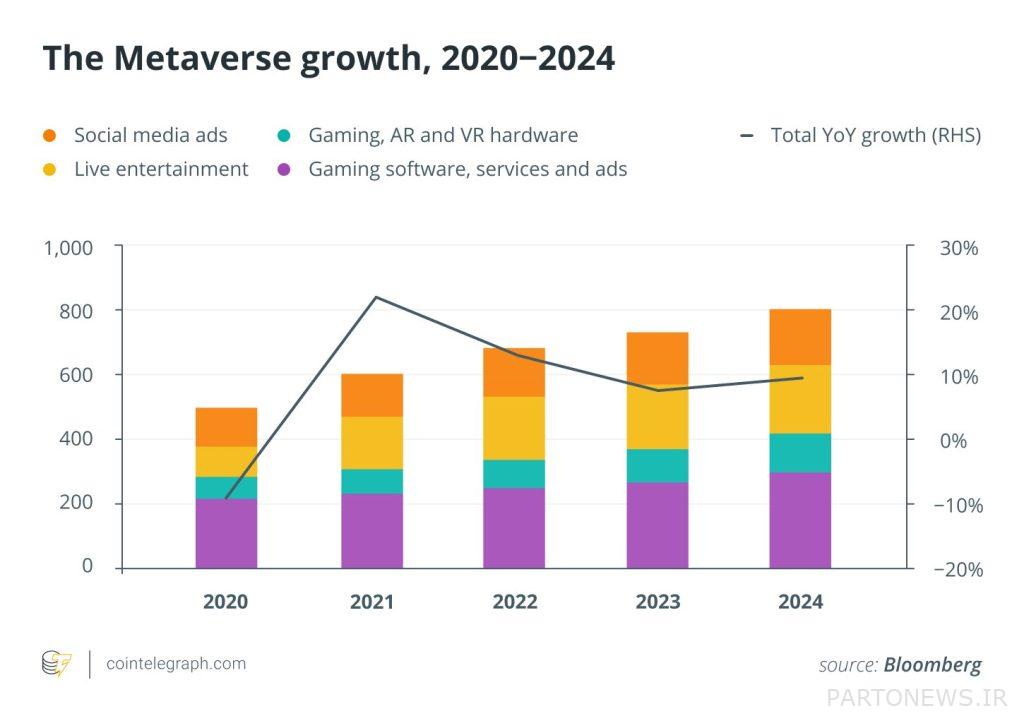متاورس; Will the future of the Internet be centralized or decentralized?

About a month ago, Facebook changed its brand name to Meta and announced plans to start developing Metavars. Metavars is a new way to interact with the Internet. The outlook for the MetaRoss industry now has a multibillion-dollar giant called Meta competing for the helm, making its future even more uncertain.
Whether we like it or not, large companies are likely to play an important role in how Metavars develops and evolves. But will it continue to face the same problems that today’s social networks face, or will decentralized platforms and services be the focus this time around?
Kalani Moe, co-author of the Kevin Telegraph website, recently Note Has compared the role of large technology companies and decentralized blockchain-based platforms in the future of Metavars. You will read this note from the author below.
Also read: What is Metavars? Everything about living in the digital world
Is Facebook a good trustee for Metavars?
At last week’s Facebook Connect conference, Mark Zuckerberg, co-founder and CEO of Meta, announced plans to spend $ 10 billion to develop Metavars. Metavars is an ecosystem of interconnected digital experiences, services and platforms that integrate seamlessly with the real world.
The company has already repeatedly shown that it seeks strict controls over how it is used and accessed, such as when it waived its obligation not to have a Facebook account to use Oculus products. . However, creating dependence on the ecosystem is a popular and proven way to force users to constantly interact while monopolizing competition.
Given that Zuckerberg has personally called Metavars the “next generation of the Internet” that will be used by hundreds of millions of users, it seems unlikely that this large company, with shareholders it must satisfy, will put all its efforts behind it. Do not do the scene to turn the meta into the main center of the metavers.
Undoubtedly, with the new solutions that this vision offers to create new works, socialize and work online, Metavars will continue to become an all-encompassing medium that most people familiar with the Internet will interact with to some extent.
The Wall Street Journal recently published a report criticizing Facebook, revealing that the social network is involved in a lot of problems and has very suspicious business activities; From lawsuits against the company for negligence in controlling malicious content on social networks to licensing certain users. All of this is in stark contrast to Zuckerberg’s view of the Metavars, in which equality is paramount.
The documents also show that Facebook is rapidly losing popularity among those born between 1980 and 2000; A generation that will most likely interact with Meta-related technologies.
Meta programs have already been widely criticized, and American politician Alexanderia Ocsio-Cortez recently referred to it in a Twitter taunt as “the cancer of democracy.” This seems to be the feeling of a general consensus among fans of digital currency on Twitter that they have not reacted positively to the news of Facebook’s arrival in Metavars.
Oxy Cortez tweeted:
Meta can describe himself as follows: “We are the cancer of democracy, created to strengthen the global surveillance machine and political propaganda for authoritarian regimes and the destruction of civil society. “For the benefit!”
This game is a hoax and will not benefit users. Meta wants to own the users ‘digital identities and, given its route, will have more access to users’ data than ever before.
The role of the Chinese block in Metavars
The Chinese blockchain is expected to become widely one of the key technologies that will enable the development of a fully-fledged cyberspace as secure as the second-generation Internet of the Web.
Thanks to blockchain-based digital identity solutions that reinforce fully sustainable digital personalities and digital assets that provide access to services and products, Metavars can inherit values such as unlicensed access, censorship, security, and decentralization; The values on which China’s blockchain industry is based.
Technology leaders are seeking to infiltrate China’s blockchain infrastructure in an effort to develop and shape the Metavars based on their ideas. Moreover, Metavars is expected to experience a combined annual growth rate of 13.1 percent in the next few years, while China’s blockchain technology is projected to grow by 32.4 percent by at least 2025. Given this, there is a strong financial incentive to establish an early position in this field.

Twitter is set to be one of the first companies to enter the field with Bluesky, a decentralized social networking protocol that will eventually be used to host a variety of social networks, including Twitter itself. However, given that Twitter, like Facebook, has been the subject of much debate, such as suspicious suspensions of some accounts, hacking of celebrities’ accounts, and numerous reports of government censorship, it is not clear that this set of basic principles has been accepted. Does it follow in the Chinese blockchain industry or not?
Twitter and many other social networks have been banned in several countries. As we have seen before on Facebook’s digital wallet, Novi, corporate digital currency projects are increasingly under the scrutiny of surveillance devices; An event that often limits their scope of activity and ultimately leads to the presentation of a poor product in which the balance between profit and progress tends towards profit.
A wide range of social networks belonging to the digital currency industry and meta-projects are currently under development. These platforms have a key technical advantage over corporate-sponsored products, and that is that they can remain licensed and democratic. This includes projects such as Decentraland and Bloktopia, which, through sophisticated and user-controlled economic systems, virtual real estate, and virtual reality-based digital experiences, become a rudimentary image of what Metavars can become. , present.
Other decentralized social networks, such as Bitorbit, are also present in this perspective. Bit Orbit is based on the Velas network, a fork of the Solana blockchain, China, designed to address issues that have made the use of corporate social media a bitter experience for users and content creators. Bit Orbit uses blockchain to restore privacy and help users make better money from their content and conduct online transactions securely.
Given the potential of Metavars to make fundamental changes in the way users interact with each other and in their daily lives, this ecosystem is evolving so that we all have access to a very important core technology.
Because large corporations are competing with the motivated and, of course, blockchain and digital currency community over the nature and development of Metavars, it is not yet clear whether Metavars is another tool designed to exploit a particular group or something. That is what everyone wants.

